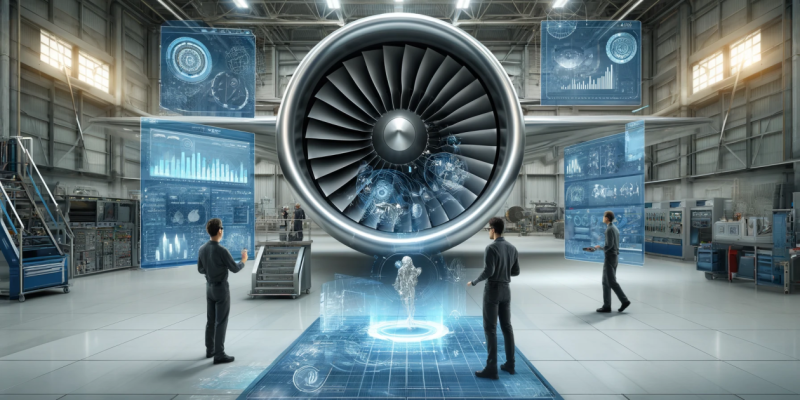MS Aerospace Engineering
Propel Innovation. Design the Future of Flight.

Aerospace Engineering, often considered a subdiscipline of Mechanical Engineering, is a highly specialized field that focuses on the design, development, testing, and production of aircraft, spacecraft, and related systems. The field itself can further be categorized into aeronautical engineering, which deals with vehicles that operate within the Earth’s atmosphere, and astronautical engineering, which focuses on vehicles that operate outside Earth’s atmosphere.
Over the course of academic programs and career thereafter, aerospace engineers use principles from physics, mathematics, and materials science to solve complex problems and drive innovation in propulsion, avionics, aerodynamics, and structural design while also collaborating with peers (through societies such as the American Institute of Aeronautics and Astronautics, AIAA) to stay updated on the latest technological advancements and industry trends.
Career Pathways
Aircraft Design
Aircraft design engineers play a critical role in the development of new aircraft, from commercial airplanes to military jets. They are involved in various stages of design, including aerodynamics, structural integrity, materials science, and systems integration. These engineers utilize advanced simulations and testing to ensure optimal performance, safety, and fuel efficiency while adhering to strict regulatory standards.
Jet Propulsion
Jet propulsion engineers focus on the development and optimization of engines (turbofan, turbojet, turboprop) that power aircraft, spacecraft, and missiles. The work involves designing, testing, and improving the performance of jet engines, turbofan engines, and rocket propulsion systems, while also enhancing fuel efficiency, reducing emissions, and increasing thrust and reliability. These engineers apply thermodynamics, fluid dynamics, and material science to solve complex propulsion challenges.
Avionics
Avionics engineers specialize in the design, development, and maintenance of the electrical and electronic systems found in aircraft and spacecraft. These systems include navigation, communication, flight control, radar, and instrumentation. Avionics engineers work on ensuring that these systems function flawlessly under extreme conditions and comply with aviation safety standards. They also collaborate with software engineers to integrate control systems and ensure system reliability.
Space Systems
Space systems engineers are responsible for the design, integration, and management of spacecraft, satellites, and space exploration missions. They oversee the development of launch systems, spacecraft propulsion, thermal management, power systems, and mission-specific hardware. Space systems engineers work closely with scientists, astronauts, and other engineers to design spacecraft that can operate in the harsh conditions of space.
The future of aviation and space exploration lies with you. Let us help you make the first step in shaping tomorrow's skies.
How we help our Clients
School Exploration and Selection
The MS in Aerospace Engineering program builds upon one’s undergraduate knowledge of mechanical/aerospace engineering. While the coursework is largely similar across schools, their faculty, research facilities, and industry partners vary greatly. We help you assess your career goals and preferences, and then target schools that would position you for success.
CV
A CV for the MS in Aerospace Engineering requires a focus on coursework related to fluid mechanics, thermodynamics, aircraft design and materials. However, schools also consider practical experience such as papers, projects, and internships favourably. We work with you to highlight your technical knowledge and display the practical experience you gained and impact you created in a coherent and concise manner.
Statement of Purpose
The SOP conveys one’s motivation, career goals, and ways in which the MS program in terms of coursework, faculty, and research facilities is the ideal degree program. We work with you to highlight these topics in a coherent and concise manner, but also touch upon ways you could address industry challenges such as sustainability (electrical propulsion and sustainable fuels), supply chain disruptions, and geopolitical risks.
Letters of Recommendation
Letters of recommendation for this degree program are largely considered to be a supportive document to validate your achievements, traits, and contribution that would position you to succeed in this highly specialised program. We help you choose individuals who can speak of your ability to not simply repeat your achievements but highlight the impact or value it created for yourself, classmates, or the community in general.
Post-Application Guidance
The MS in Aerospace Engineering opens career pathways in commercial aviation or space exploration. While a few courses are mandatory, based on your career goals, we advice you on the remainder of the courses you could study to position yourself ideally to future employers post-graduation.
Our MS Aerospace Engineering highlights
20+
Tier 1 Schools Covered
100%
Success Rate since 2021
8.5
Average CGPA of our Clients
320
Average GRE of our Clients
Our clients have received offers from,
- Georgia Institute of Technology
- University of Southern California
- Pennsylvania State University
- Purdue University
- University of Michigan-Ann Arbor
- University of Maryland-College Park
- Texas A&M University
- Arizona State University
- Illinois Institute of Technology
- University of Cincinnati